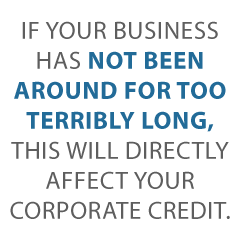- Connect With Us!
- (877) 600-2487
- info@creditsuite.com
5 critical factors that determine your business credit worthiness
Published By Janet Gershen-Siegel at September 21st, 2017
Your business credit worthiness is a lender calculation. It determines the possibility a borrower might default on debt obligations. It considers several different factors – here are five critical ones.
5. Repayment History
Late payments are going to affect your business credit score for a good seven years. If you change and improve your payment history, it has a definite impact. So pay your business (and personal) debts off, as quickly as possible and as completely as possible. You can make a very real difference when it comes to your credit scores.
Always make sure to pay on time and you will reap the rewards of punctuality. There is nothing else which will affect your business credit worthiness more than this.
4. Personal Credit Score
Because your business credit score is a kind of shorthand look into your business’s solvency, banks and other lenders take it seriously. Your business credit scores will start off low, because you will have very little in the way of credit history. As a result, lenders will often take a look at your personal credit scores.
Therefore, if your personal credit scores are good, a lender will be more inclined to give your small business favorable terms. If your personal credit scores are not so good, then your small business will not get such favorable lending terms. Or your company might not get a loan at all.
Hence it’s a way to gauge business credit worthiness.
3. Credit History Length
How long has your company has been using business credit? By definition, newer businesses will have short credit histories. If your business’s credit history is short, do not despair. Credit reporting bureaus will also take a look at your personal credit score and your own personal history of payments.
If they determine that your personal credit is good, and in particular if you have a fairly long credit history, then your personal credit can essentially come to the rescue of your corporate. Therefore, you should not have gotten your first credit card last week.
Naturally, the opposite is also true – if your personal credit history is not so hot, then it will negatively affect your corporate credit scores. And it will do so until your business and personal credit can be separated.
As a result, it can affect your business credit worthiness.
2. Personal Credit History can affect Business Credit History – and vice versa
Building on the last point, consider your own personal credit history and behavior. If you are having a bad business year, it could conceivably end up on your personal credit score. Hence if your business has not been around for too terribly long, this will directly affect your corporate credit and, in turn, your business credit worthiness.
However, there are some things you can do. You can take steps to unlink the two by working to separate them. For example, if you get credit cards only for your small business, or you open up business checking accounts and other bank accounts (or even get an unsecured business loan), then the credit reporting bureaus will begin to treat your personal and corporate credit as separate matters.
Also, you can pay your company’s bills with your company credit card or business checking account. Plus, make sure it’s the business’s name on the bill and not your own.
Sole Proprietors Take Note
If you operate a company as a sole proprietor, make sure to incorporate. Or at the very least be sure to file for a DBA. This is ‘doing business as’ status.
If you do not, then your personal name is the same as the company name. Hence, you can end up being personally responsible for all small business debts.
Also, per the IRS, with this structure there is a 1 in 7 chance of an IRS audit. There is a 1 in 50 chance for corporations! Avoid confusion and drastically lower the chances of an IRS audit at the same time.
1. Your Credit Utilization Rate
A personal or business credit utilization rate just means the amount of money you have on credit as divided by total available credit. Lenders generally do not want to see this go above 30%. Therefore, for each $100 in credit, do not borrow on more than $30 of that. If this percentage is going up, then you will need to spend down and pay off your debts before trying to borrow more.
This will directly affect your business credit worthiness.
Bonus: Improve Your Business Credit Worthiness By Building Business Credit
Small business credit is credit in a company’s name. It doesn’t attach to an owner’s personal credit, not even when the owner is a sole proprietor and the sole employee of the company.
Accordingly, a business owner’s business and consumer credit scores can be very different.
The Benefits
Since company credit is independent from consumer, it helps to secure a business owner’s personal assets, in the event of a lawsuit or business bankruptcy.
Also, with two separate credit scores, a business owner can get two separate cards from the same vendor. This effectively doubles purchasing power.
Another advantage is that even start-ups can do this. Heading to a bank for a business loan can be a recipe for disappointment. But building small business credit, when done the right way, is a plan for success.
Personal credit scores depend on payments but also additional components like credit usage percentages.
But for business credit, the scores actually only depend on if a company pays its invoices in a timely manner.
The Process
Building business credit is a process. It does not happen without effort. A business has to proactively work to establish business credit.
Still, it can be done easily and quickly, and it is much quicker than developing consumer credit scores.
Vendors are a big part of this process.
Undertaking the steps out of order results in repetitive rejections. Nobody can start at the top with business credit. For example, you can’t start with retail or cash credit from your bank. If you do, you’ll get a rejection 100% of the time.
Improve Your Business Credit Worthiness with Business Fundability
A company must be fundable to lending institutions and merchants.
As a result, a small business needs a professional-looking website and email address. And it needs to have site hosting bought from a supplier such as GoDaddy.
In addition, business phone and fax numbers need to have a listing on 411. You can do that here: http://www.listyourself.net.
Additionally, the business telephone number should be toll-free (800 exchange or the like).
A business also needs a bank account dedicated solely to it, and it has to have all of the licenses necessary for running.
Licenses
These licenses all must be in the identical, correct name of the business. And they must have the same business address and telephone numbers.
So keep in mind, that this means not just state licenses, but potentially also city licenses.
Learn more here and get started with building business credit with your company’s EIN and not your SSN.
Dealing with the IRS
Visit the IRS website and get an EIN for the business. They’re free. Choose a business entity such as corporation, LLC, etc.
A company can get started as a sole proprietor. But they more than likely wish to change to a sort of corporation or an LLC.
This is to limit risk. And it will make best use of tax benefits.
A business entity matters when it comes to tax obligations and liability in the event of litigation. A sole proprietorship means the owner is it when it comes to liability and taxes. Nobody else is responsible.
Starting the Business Credit Reporting Process
Begin at the D&B web site and get a totally free D-U-N-S number. A D-U-N-S number is how D&B gets a company in their system, to produce a PAYDEX score. If there is no D-U-N-S number, then there is no record and no PAYDEX score.
Once in D&B’s system, search Equifax and Experian’s sites for the business. You can do this at fastcs.wpengine.com/reports. If there is a record with them, check it for accuracy and completeness. If there are no records with them, go to the next step in the process.
This way, Experian and Equifax have activity to report on.
Vendor Credit Tier
First you should build trade lines that report. This is also referred to as the vendor credit tier. Then you’ll have an established credit profile, and you’ll get a business credit score.
And with an established business credit profile and score you can begin to get credit in the retail and cash credit tiers.
These types of accounts tend to be for the things bought all the time, like marketing materials, shipping boxes, outdoor workwear, ink and toner, and office furniture.
But first off, what is trade credit? These trade lines are credit issuers who give you starter credit when you have none now. Terms are generally Net 30, rather than revolving.
Therefore, if you get approval for $1,000 in vendor credit and use all of it, you need to pay that money back in a set term, such as within 30 days on a Net 30 account.
Details
Net 30 accounts have to be paid in full within 30 days. 60 accounts have to be paid completely within 60 days. In contrast to with revolving accounts, you have a set time when you must pay back what you borrowed or the credit you used.
To launch your business credit profile properly, you should get approval for vendor accounts that report to the business credit reporting agencies. Once that’s done, you can then use the credit.
Then repay what you used, and the account is on report to Dun & Bradstreet, Experian, or Equifax.
Vendor Credit Tier – It Helps
Not every vendor can help in the same way true starter credit can. These are vendors that grant an approval with marginal effort. You also want them to be reporting to one or more of the big three CRAs: Dun & Bradstreet, Equifax, and Experian.
You want 5 to 8 of these to move onto the next step, which is the retail credit tier. But you may have to apply more than one time to these vendors. So, this is to demonstrate you are reliable and pay on time. Here are some stellar choices from us: https://oldcs.creditsuite.com/blog/5-vendor-accounts-that-build-your-business-credit/
Accounts That Don’t Report
Non-reporting trade accounts can also be helpful. While you do want trade accounts to report to at least one of the CRAs, a trade account which does not report can yet be of some value.
You can always ask non-reporting accounts for trade references. Additionally credit accounts of any sort ought to help you to better even out business expenses, thus making budgeting easier. These are companies like PayPal Credit, T-Mobile, and Best Buy.
Retail Credit Tier
Once there are 5 to 8 or more vendor trade accounts reporting to at least one of the CRAs, then progress to the retail credit tier. These are companies which include Office Depot and Staples.
Just use your Social Security Number and date of birth on these applications for verification purposes. For credit checks and guarantees, use the company’s EIN on these credit applications.
One example is Lowe’s. They report to D&B, Equifax and Business Experian. They want to see a D-U-N-S and a PAYDEX score of 78 or higher.
Fleet Credit Tier
Are there 8 to 10 accounts reporting? Then move onto the fleet credit tier. These are companies like BP and Conoco. Use this credit to buy fuel, and to repair, and maintain vehicles. Just use your SSN and date of birth on these applications for verification purposes. For credit checks and guarantees, make certain to apply using the company’s EIN.
One such example is Shell. They report to D&B and Business Experian. They need to see a PAYDEX Score of 78 or better and a 411 business phone listing.
Shell may claim they want a specific amount of time in business or revenue. But if you already have enough vendor accounts, that won’t be necessary. And you can still get approval.
Learn more here and get started with building business credit with your company’s EIN and not your SSN.
Cash Credit Tier
Have you been sensibly managing the credit you’ve up to this point? Then progress to the cash credit tier. These are companies like Visa and MasterCard. Just use your SSN and date of birth on these applications for verification purposes. For credit checks and guarantees, use your EIN instead.
One such example is the Fuelman MasterCard. They report to D&B and Equifax Business. They need to see a PAYDEX Score of 78 or higher. And they also want you to have 10 trade lines reporting on your D&B report.
Plus, they want to see a $10,000 high credit limit reporting on your D&B report (other account reporting).
Also, they want you to have an established business.
These are companies like Walmart and Dell, and also Home Depot, BP, and Racetrac. These are frequently MasterCard credit cards. If you have 14 trade accounts reporting, then these are attainable.
Learn more here and get started with building business credit with your company’s EIN and not your SSN.
Improve Your Business Credit Worthiness and Monitor Your Business Credit
Know what is happening with your credit. Make certain it is being reported and fix any mistakes ASAP. Get in the practice of checking credit reports and digging into the details, and not just the scores.
We can help you monitor business credit at Experian and D&B for only $24/month. See: fastcs.wpengine.com/monitoring.
And at Equifax, you can monitor your account at: www.equifax.com/business/business-credit-monitor-small-business. Equifax will cost about $19.99.
Update Your Data
Update the data if there are inaccuracies or the relevant information is incomplete. This is yet another way to increase your business credit worthiness.
Fix Your Business Credit
So, what’s all this monitoring for? It’s to contest any inaccuracies in your records. Errors in your credit report(s) can be taken care of. But the CRAs often want you to dispute in a particular way.
Get your company’s PAYDEX report at: www.dnb.com/about-us/our-data.html. Get your company’s Experian report at: www.businesscreditfacts.com/pdp.aspx?pg=SearchForm. And get your Equifax business credit report at: www.equifax.com/business/credit-information.
Disputes
Disputing credit report inaccuracies normally means you send a paper letter with duplicates of any evidence of payment with it. These are documents like receipts and cancelled checks. Never send the original copies. Always mail copies and retain the original copies.
Fixing credit report mistakes also means you precisely detail any charges you dispute. Make your dispute letter as crystal clear as possible. Be specific about the problems with your report. Use certified mail to have proof that you mailed in your dispute.
A Word about Building Business Credit and Improving Business Credit Worthiness
Always use credit sensibly! Don’t borrow more than what you can pay back. Keep track of balances and deadlines for repayments. Paying on time and completely does more to raise business credit scores than virtually anything else.
Growing company credit pays off. Great business credit scores help a small business get loans. Your credit issuer knows the business can pay its debts. They recognize the business is authentic.
The business’s EIN connects to high scores and lenders won’t feel the need to demand a personal guarantee.
Takeaways
Business credit is an asset which can help your business for years to come. We can help you get started toward improving your business credit worthiness.

 " class="attachment-blog-single size-blog-single wp-post-image" alt="Get Business Credit Cards for New Businesses Credit Suite-Business Line of Credit Decoded" title="Get Business Credit Cards for New Businesses">>
" class="attachment-blog-single size-blog-single wp-post-image" alt="Get Business Credit Cards for New Businesses Credit Suite-Business Line of Credit Decoded" title="Get Business Credit Cards for New Businesses">>